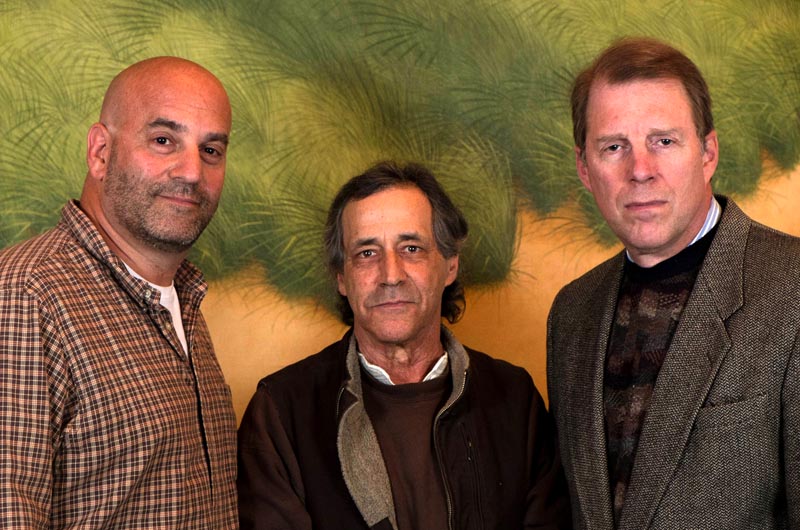As town election season arrives on the Vineyard, the ballots are looking familiar and sparse. There are few contested races and in some towns there are blank spaces on the ballot.
The lack of candidates, which appears to be a fairly recent phenomenon, has some people pondering the state of civic engagement on the Island.
For the second year in a row, at least three Island towns are facing an election season without a single contested race. Ballots are set for Chilmark, Edgartown and West Tisbury without any candidates facing opposition — in fact, some positions are lacking any candidates at all.
Voters were faced with few decisions at the ballot box last year, too. There was one contested race on the Island last year for the Oak Bluffs water district commission. Incumbent Michael S. deBettencourt held his seat despite a challenge from George E. Brown.
This year, Oak Bluffs once again offers the only excitement so far in the political landscape, with contests for board of selectmen, school committee, planning board, finance and advisory committee and, again, water commission.
Ballots are not yet set in Tisbury and Aquinnah, which have later town elections.
Ten or 15 years ago, the League of Women Voters of Martha’s Vineyard held candidate forums in almost every town, league voter services chairman Judy Crawford said. “Occasionally there were no contested races, but it was very rare. Then it got less and less and less.”
Last year there were zero candidate forums. The League will hold one candidate forum this year, in Oak Bluffs.
“It’s very sad to me that we’re down to just one town that is contested,” said Mrs. Crawford, who served on the West Tisbury conservation commission for 15 years. “It’s a great way for voters to be really educated about voting.”
She said contested races are an opportunity for people to get invested in their town and learn how the government works.
“It’s a healthy situation to get contested offices,” she said. “If they choose the same people again then fine, they’ve made an educated decision, they’ve listened to the pros and cons. When there’s no choice they just check off who’s there.”
Long-term selectmen will eventually step down, and “we want to have people in the pipeline who have town experience,” she said. “If it’s just the same people there all the time . . . they all gray at the same time and we’re left with people without experience.”
Island towns vary along the spectrum from little change to a lot. Since 2000, there have been two contested races for Edgartown selectmen, and the current board has been the same since 2003.
Oak Bluffs is a different story. While selectman Gail Barmakian ran unopposed last year, the town has had contested races for the board of selectmen for all but one of the last 15 elections, seeing as many as five candidates vying for two spots on the board of selectmen.
This year, finance advisory committee member Abraham L. Seiman is running against incumbents Walter Vail and Michael Santoro for the two spots on the board of selectmen.
Mr. Seiman said he’s seen few contested races in the four years he’s lived full time in Oak Bluffs. “I think there’s a lot of apathy among the voters,” he said, adding that he decided to run to try to have a bigger role in what happens at the town level.
“The other reason is to break into the lethargy of the voters,” he said. “The feeling is that their vote doesn’t matter. But it does matter . . . they have the ultimate say.”
Tisbury, too, has seen action in the board of selectmen race, with 11 of the last 14 elections having more than one candidate for a seat.
Only four of Chilmark’s board of selectmen elections have been contested since 2000, and six selectmen elections in West Tisbury and Chilmark have been contested in that time period.
Those who have served in elected office note that it can be a tough task, especially for those already busy with jobs and families.
“People have to be really dissatisfied to get up and do it themselves,” said Chris Murphy, who has long been active in town politics and now serves on the Chilmark board of appeals and conservation commission. “As much as you may not love what somebody else is doing, the fact of the matter is they’re doing it and then you don’t have to do it.”
“On a national scale, politics is much more visceral and about ideas, but on a local scale it’s more about just getting the job done,” he said. “Somebody has to make sure that the highways get taken care of and that the highway superintendent gets paid.”
Mr. Murphy said the issue goes back to civic involvement, from serving as a volunteer firefighter to sitting on the finance committee. “To me, being a citizen in the town, part of your job is to be involved.”
Especially so on the Vineyard, he said. In the 1960s on the Island, he said, “there was a lot fewer people and so people had to get more involved.”
The Island is now growing, and some people move here from bigger communities. “I think as we grow as a community or as a series of towns that make a community, we have to keep looking back at that,” Mr. Murphy said. “How do you encourage across the spectrum, community involvement from everything to church dinner to being a selectman?”
“The community has to earn it, encourage it, foster it, celebrate it,” he added.
“Younger people are very willing to get involved,” he said, but with jobs and children “just coming up with the time where you can allow for public involvement is hard.”
“My wife and I have this conversation periodically,” he said. “She says in each family you can sort of afford to have one person do that and the other person has to cover for them. One person is sitting in a meeting in the town hall while the other person is at home cleaning the house, picking up the kids . . . you both are paying the price for that.”
Jed Smith, 42, ran for the Aquinnah planning board because the board needed someone and as a contractor, he said, he was interested in learning how the permitting process works and implementing positive regulations.
But with three children under 10, he said, the meetings were hard to make. “It was mostly a time thing for me, the little bit of free time I had with family,” he said. He no longer serves on the board.
“Most of the board that I was on was older retirees who were fairly well off financially,” Mr. Smith said. “They didn’t necessarily represent the town demographic, which is unfortunate.”
Though there was interest in having younger people serve on boards, “you need people who have time to volunteer and resources to volunteer,” he said, noting that a fairly small pool of people end up serving on town government. “Aquinnah’s a small town, though.”
Edgartown selectmen Art Smadbeck said the focus should not be on whether elections are contested or not, but “do we have somebody good running for that office.” Edgartown has worked to make sure there are people to fill appointed and elected positions, he said.
“It’s one of those things where you have a certain number of people who have the time to commit, and there’s a lot of people who I’m sure at some point in their life and career will have the time,” Mr. Smadbeck said. “We’ve been very fortunate in Edgartown that we’ve had excellent people, I think, serving in most of the capacities that we’ve needed . . . it’s very rare that we run into a situation that we don’t have somebody running for an office.”
“We have a pool of engaged citizens,” he added. “I see them at the selectmen meetings. They come, they’re interested.”
Mr. Smadbeck said he would like the candidates’ forums to take place even without a contested election. “There really is a value to it,” he said. “Even if I’m not contested, it’s a chance for me to say well this is what I’m thinking about for the next three years, this is why I want to do this, this is why I want to continue to do this. It helps me to focus.”
Tristan Israel is a seven-term Tisbury selectman, and he said he’s considering holding a seminar about how people can run for office. In the past he has given talks to high schoolers about elected office.
“I think somehow we need to start to come up with ways we can engage the community in a dialogue about participating and about how easy it is to participate,” he said.
Mr. Israel said state and national politics can impact people’s interest in local politics. “People sort of get turned off and say, well it’s politics and I can’t make a difference. But actually on a local level I think it’s very easy to make a difference,” he said. “I think most towns are eager for people to participate and there are easy ways that they can be done.”
He said the key is to change the mentality that politics “is all sort of nefarious,” and show how easy it is to get involved. A more difficult challenge is getting people between ages 21 and 45 to get involved, he said. “They’re trying to make careers, trying to raise families, trying to basically get on with their lives,” he said. “There may be things we can do to accommodate that age group as well.
“Zoning changes affects your life, for example, probably more than the stuff that goes on in Washington,” he added. “All politics is local.”









Comments (3)
Comments
Comment policy »